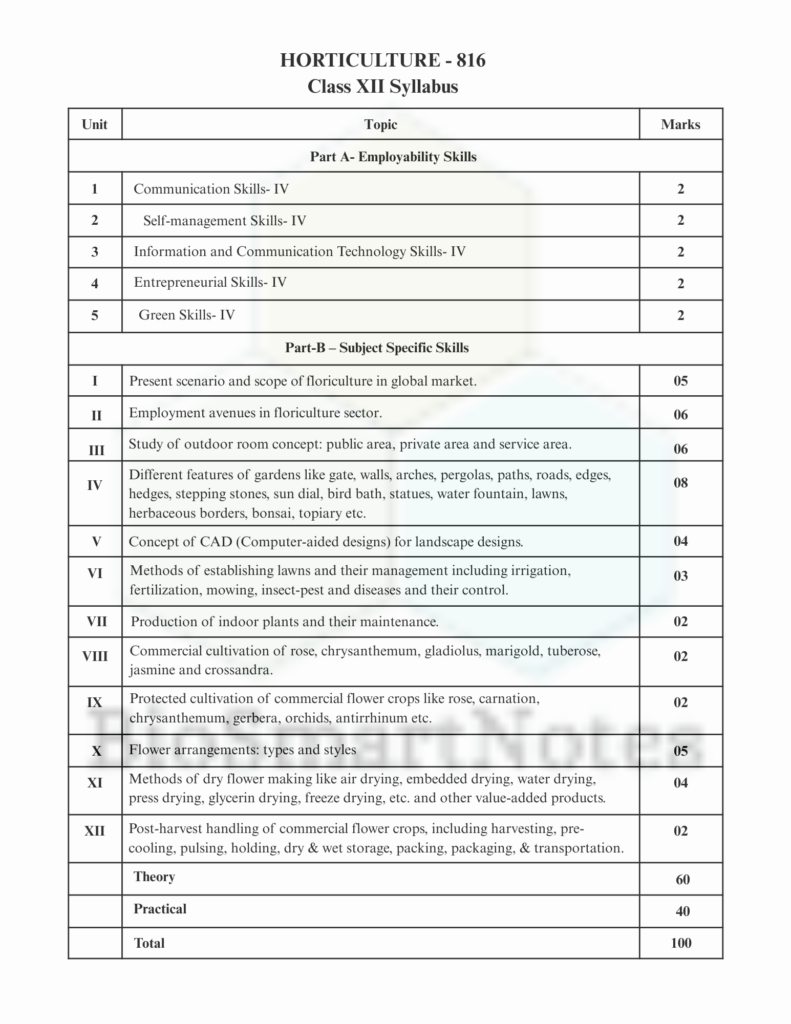Horticulture is a specialized and fascinating branch of agriculture that focuses on the science and art of growing fruits, vegetables, flowers, ornamental plants, and medicinal herbs. In Class 12, the subject becomes more advanced and career-oriented, giving students hands-on knowledge about plant production, nursery management, landscaping, pest control, and post-harvest handling.
The Class 12 Horticulture Syllabus 2025-26 is thoughtfully designed to connect theoretical concepts with practical field applications. Whether you’re from a rural background, interested in gardening, or aiming for a professional career in agricultural sciences, this subject lays a strong foundation.
Why Study Horticulture in Class 12?
Horticulture is not just about planting trees or growing vegetables—it is a science that integrates biology, technology, and environmental awareness to ensure sustainable food and aesthetic plant production. Here’s why this subject is a smart choice:
- It helps you understand plant care and management techniques
- It builds practical skills for modern agricultural practices
- It opens pathways to careers in farming, floriculture, landscaping, and agri-business
- It teaches entrepreneurship and value-added production
- It encourages sustainable and eco-friendly farming methods
Class 12 Horticulture Syllabus 2025-26

What You’ll Learn in Class 12 Horticulture
The syllabus generally includes a balanced mix of theory and practical knowledge, with a focus on the following key areas:
- Fruit and Vegetable Production: Study the scientific methods of growing and managing fruit crops (like mango, banana, guava) and vegetables (like tomato, brinjal, potato).
- Nursery Management: Learn how to propagate plants, prepare nursery beds, and maintain plant health in early growth stages.
- Floriculture: Understand flower production, greenhouse management, and use of ornamental plants in landscaping and decoration.
- Post-Harvest Handling: Explore methods for storing, grading, packaging, and transporting horticultural produce.
- Pest and Disease Management: Get introduced to plant protection practices and eco-friendly pest control techniques.
- Soil and Water Management: Learn the importance of irrigation, fertilizers, and soil health in horticulture.
- Entrepreneurship and Marketing: Develop knowledge about managing small-scale horticultural enterprises and selling produce in the market.
This subject is very hands-on, and students often enjoy the connection it builds with nature and real-world farming practices.
How to Prepare for Class 12 Horticulture
Here are some effective ways to study horticulture and perform well in your board exams:
✅ Focus on Practical Applications
Try to connect each topic with real-life examples. Observe how plants grow in your area, visit nurseries or farms if possible, and learn from local experts.
✅ Use Visual Aids
Draw and study diagrams of plant parts, tools, irrigation systems, and planting techniques. Well-labeled diagrams often fetch extra marks in exams.
✅ Prepare a Glossary
Horticulture includes many scientific and technical terms. Prepare a glossary for terms like grafting, mulching, pruning, weeding, and composting for quick revision.
✅ Watch Educational Videos
Supplement your textbook with online resources and videos that demonstrate techniques like budding, drip irrigation, or seed treatment.
✅ Solve Previous Years’ Papers
Practice old question papers to understand the question pattern, mark distribution, and frequently asked topics.
Importance of Practical Work in Horticulture
The practical component is a vital part of the Class 12 Horticulture syllabus. It may include:
- Identifying plant species and horticultural tools
- Performing propagation methods like cutting, layering, or grafting
- Preparing potting mixtures and nursery beds
- Observing pest damage and suggesting control methods
- Handling and packaging of harvested produce
Be attentive during practical sessions, maintain a neat and detailed practical file, and revise your experiments before your viva exams.
Career Scope After Studying Horticulture
Horticulture offers exciting opportunities in both the public and private sectors. After Class 12, you can pursue:
- B.Sc. in Horticulture or Agriculture
- Diploma in Nursery Management or Landscaping
- Courses in Floriculture, Greenhouse Technology, or Organic Farming
- Entrepreneurship in Agribusiness or Gardening Services
Career options include working as:
- Horticulture Officer
- Nursery Manager
- Floriculturist
- Landscape Designer
- Plant Pathologist
- Agripreneur or Consultant
As the world moves towards sustainable living and organic food, the demand for skilled horticulture professionals is only growing.
Tips to Score Well in Horticulture
- Follow the prescribed textbook and syllabus closely.
- Practice drawing neat and accurate diagrams.
- Revise definitions and technical terms regularly.
- Keep your practical work well-organized and updated.
- Attend demonstrations and field visits attentively.
- Use examples from your local area when possible in long answers.
Conclusion
The CBSE Class 12 Horticulture Syllabus 2025-26 is more than just a subject—it’s a gateway to learning how to grow, nurture, and protect the green world around us. It teaches patience, responsibility, and scientific thinking while offering real-world applications that go beyond the classroom.
Whether you’re preparing for a career in agriculture or simply want to understand how food and flowers grow, horticulture is a subject that will equip you with lifelong knowledge and skills. With the right preparation and passion, you can bloom in both exams and your future.



